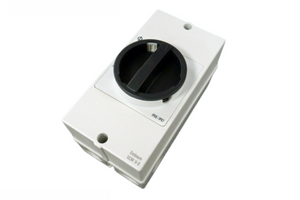Isolators for Solar Panels4 Comments3 February 2022 | Paul A product we get asked for a lot is 2-pole isolators for use with solar panels. These requests come off the back of several YouTube videos & guides saying these units are needed in a solar setup, but we wanted to break down the myths behind these switches and explain why they may do more harm than good.
Myth 1 - 'Your battery will be over-charged if left permanently connected to the solar panel, so it needs to be isolated'Solar panels produce energy when exposed to sunlight and this energy is used by a PWM or MPPT solar charge controller to provide a suitable charging voltage to your battery. The solar controller will sense the state of charge of your battery and if the battery is fully charged, the controller will enter a lower voltage 'float' mode that prevents the battery from self-discharging and holds it at its maximum state of charge. Given this, there is no risk of over-charging the battery and so no need to isolate the panel from the controller/battery. By disconnecting the panels from the battery using an isolator you are losing this 'float' function that your controller provides and your battery will slowly start to self-discharge. By leaving the panels permanently connected to the battery via the solar controller, the system can monitor your battery and keep it in the best condition. Myth 2 - 'I need to isolate my panels to work on my 12 volt system'One reason people are sometimes advised to fit isolators in between panels and controllers is to allow them to work on the their 12 volt systems. If you're working on circuits being powered by your battery then you do need to isolate the main power feed from your battery to these circuits, so having an isolator at this point definitely is useful, but unless your are working on the solar part of your system, you can leave the solar panel connected and it will continue to charge your battery, keeping it in the best condition ready for use when you're ready to reconnect your circuits. If you need to work on the solar part of your 12 volt system you would probably be advised to isolate your battery from the solar controller, and this can be achieved simply by removing the fuse in the positive cable between the solar controller and the battery. The negative effect of isolator switches on solar systems. So, isolators between the solar panel and solar controller are not really necessary and can actually be detrimental to your system. Every time you add a joint, connection or switch to your circuits you introduce a point of resistance which, in turn, limits the flow of energy from the panel to the controller. This means you are losing some of the energy harvested by your panel, resulting in poorer battery charging performance. For similar reasons, fusing the solar cable between the panel and controller is not recommended as the cable is typically rated to a much higher current than the panel could ever produce (so it would not be subject to a dangerous over-current condition) and the fuse would just increase resistance that would reduce the efficiency. This resistance may seem small but when taking into account the relatively low power produced by panels, even a slight dip in performance can drastically impact your rate of charge. With all this in mind we would recommend not having a fuse, switch or breaker in your solar cable between the panel and your charge controller. This is safe to do & will allow the maximum amount of the energy your panel harvests to reach your controller for charging your battery. To read more on Solar Power see our guide here
|
|
12 Volt PlanetAuto & Marine Electrical Components |










On a narrowboat can I leave battery charger switched on when on shore supply even though solar panel is still connected, ie charger and solar are in parallel?